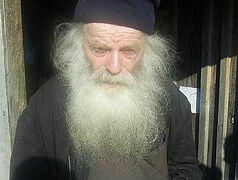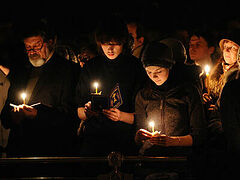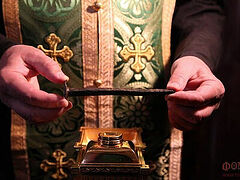Protosinghel Petroniu (in the world Petru Tănase; 1916-2011) is one of the revered Romanian elders of the twentieth century. For many years, he was the abbot of the Romanian cenobitic Prodromu (Nativity of St. John the Forerunner) Skete on Holy Mount Athos. The Elder enjoyed great authority not only on Athos, but throughout all of Greece, and of course in his native land of Romania, where he had to firmly defend his faith in the years of the communist regime.
On April 27, 2023, his relics were uncovered at the skete. Elder Petroniu is one of the Romanian spiritual confessors proposed for canonization in 2025.
In this article, the Elder speaks about how a Christian should live, how to conduct spiritual battle with our passions, and how to multiply faith and love in a world full of hatred.
Part 1. How to Make Your Life an Unceasing Prayer
***
—How can we be delivered from the passions?
—Passionlessness is the most important and most difficult work, as the Holy Fathers say. You can’t grow plants in a garden if you don’t dig and fertilize the ground. If there are hard clods and roots, first you have to get rid of them so something can grow. It’s the same with virtue. You have to be cleansed from sins to be able to plant virtues: to be able pray, to love others, and so on. If you’re full of passions, you can’t do it. You have to get rid of the base sins that make you a slave of spiritual insensitivity. The Holy Fathers say that virtues are planted in the soil of the heart, or the soul, after it’s been refined by rejecting worldly vanities, by bearing difficulties and sorrows, by prayer and a pure life, and it becomes receptive.
Man wants to be this and that: He wants to be rich, enjoying luxury and various pleasures, and he wants to acquire salvation and the glory of Christ. He wants to cling to worldly affairs and be with God. But this is impossible. He gets stuck in a feud with someone, and then wants to pray noetic prayer. In reality, we’re quite far from the true spiritual life. Things were quite different in the first centuries of Christianity. The Christians of that time heard the call to the spiritual life and renounced worldly splendor and glory in order to acquire the eternal glory of Christ. But now we allow the enemy to catch us and we’re seduced by vain worldly things; we don’t want to renounce the sins that make us a slave, dependent on this world, enslaved to matter; we want to have a happy life through it, hoping in material things, which is impossible, because man is a spiritual being and he can’t find happiness except through God Who created him.
—What should the life of a Christian be like?
—If a man always turns his thoughts to the commandment of love given us by Christ: A new commandment I give unto you, That ye love one another (Jn. 13:34), then his life becomes a life in Christ; if he does everything with the blessing of God, His grace, and sees in everything the gift of God, then he comes out of propensity for the world and enters into the love of Christ. True life is love, not addiction, which is unhealthy love. The Christian life is man’s return to his true health, which is a joy for him, which he perceives as the fullness of life, because Christ is poured out into this man to live in him.
To commit your will to Christ and for the life of Christ to be in you every day, you have to submit to the ascetic prescriptions of the Church, which make the soul sensitive and able to enter into communion with Christ. Fasting, prayer, humility—these are the means used by the Venerable Fathers. They don’t require any expense; moreover, they’re associated with the joy that communion with Christ brings to the soul.
By mastering the body, placing the nous as master over the sinful desires of the body, you’ll be liberated from passions, you’ll become the abode of the Holy Spirit, having made what is better master over what is worse. Thus you’ll acquire strength of spirit, which the saints acquired by ascetic labors so the inner man would grow from strength to strength to the measure of the Divinity of Christ.
This is the ideal—a Christian life, and if you want, eternal life. You have to put the body in its proper place; you have to refine it through asceticism and make it spiritual. Thus you’ll fulfill the true purpose of life—the acquisition of the Holy Spirit and His full indwelling in the soul and body of man, which is the true Christian life. This good to which man is called is neither a duty nor something done under compulsion—but it’s in his interest to do so.
God calls us: Be ye holy! (1 Pt. 1:16). He created us to partake of His Spirit and be sanctified thereby. This is the meaning of our existence on Earth—to be sanctified and enter into perfect holiness, into the true health of our being. The Christian life should be a constant preparation for this, not a grueling slavery to food and drink, like the life of people nowadays.
—How can we spend the day in holiness according to the program of the spiritual life? How can we multiply faith and love in this world, so full of hatred and devoid of love for our fellow man?
—The program of the spiritual life? Love isn’t manifest according to a program. St. Basil the Great says that a spiritual man doesn’t program his thoughts but always takes care of his soul; he’s not attached to anything earthly and always attaches his soul to the spiritual and Divine. Love is permanent because it’s eternal, and therefore it’s not manifested according to some program, but naturally brings order to the whole life of a man.
If we want to talk about a program, then it’s briefly stated in the words of the Apostle: Pray without ceasing (1 Thess. 5:17). Love is the true nature of our soul and love is how we acquire it, and the overarching program for the Christian life. No formulas! Whoever believes multiplies the faith that comes from God, because he opens his soul to the spiritual treasures to be found in God.
The greatest commandment is to love God and your neighbor as yourself—two sides of the same coin. God values love for Him and love for neighbor equally. Man is the image of God and is of great value. The Fathers say: “If you’ve seen a man, you’ve seen God.” Man bears the image of God. If you feel that God has distanced Himself from you, you have to understand that your “I” has distanced itself, detached from itself, and you need to bring it back from distraction by fervent worship and piety. Even in the trials that God allows to come to us, when we feel that grace has departed from us, we can regain God in our soul by the same path of kindling zeal and faith.
As our faith in God weakens, we lose our value. If faith grows stronger in our soul, then we’re ennobled by virtue of the inner wholeness that faith gives us. Many people no longer believe in anything nowadays—not even in themselves, in man. If someone is useful to you and makes money, he’s good; if not, he’s bad. It’s utilitarianism, which turns us into objects of labor and consumption, and we consume ourselves. The Apostles say you don’t love God if you don’t love your neighbor. If you don’t love the neighbor whom you do see, then how can you love God, Whom you don’t see (cf. 1 Jn. 4:20)? That’s probably why the rulers of the world have turned man into an object, because in their worship of money they fail to love God and they imagine themselves as masters of the world and the fate of man, in place of God.
—Tell us about the inner unity that faith and piety give us.
—Generally speaking, the Apostles teache us that man came out good from the hand of the Creator, but after the fall we are inclined towards evil. So we have to fight against this inclination and direct it towards the good so as to heal it. Although redeemed and saved by Christ, we’re not in that paradisiacal state where there was no evil and man wasn’t inclined towards it. As the Holy Fathers say, we have a “fallen nature.” We have fallen by nature, having a blind mind and a weakened will. They lead and push us towards evil, towards which the invisible enemy beckons us, as he did in Paradise. The evil one is constantly baiting us and we must constantly fight. Therefore, St. Paul calls us to gird ourselves with the virtue of righteousness, to take up the shield of faith, by which the eye of the mind sees these traps in advance, and to take up all the weapons for the battle against the evil one (cf. Eph. 6:14-17), all the armor of righteousness, to practice all these virtues and put on the will of God. The Christian life is one of constant struggle. For it to go well, we must overcome this inclination of our fallen nature and try to walk the good and true path.
—But, Father, there are times when we’re overcome, and even a spiritual man falls into temptation.
—This isn’t random. Since God knows everything, He permits this with a purpose, so it shouldn’t be considered fatal. This is given to a man because he did something, and if he hasn’t sinned in any way, then he should understand this fall as an occasion to rise higher, to mobilize after this fall and grow even more in grace. In any case, if someone fell, it means he didn’t have a state of sobriety. We know many good things, we are Christians, we hear the Holy Gospel, but our faith is weak, because the birds of the sky peck at the seeds of the word of faith sown by Christ, so we no longer have healthy natural powers to do good.
The soil of the heart becomes fruitless and barren. God is at hand, He is near to every one of us, as the holy Apostle Paul says (Phil. 4:5), but we don’t use His grace because of our distraction, the compromises that we make, because of television, because of joining societies and organizations that operate without God. We have to be sober and walk the good and holy path and fulfill the Divine teachings of the Church, which don’t need any correction, for the wisdom of the world is like a discarded rag before God (cf. Is. 64:6).
—No one can cause us any harm from outside, and all evil in the world flows from this separation of man from God.
—St. John Chrysostom tells us that no one can cause us any harm without our own will, even the devil, who is completely against us and is eager to cause us harm; without our will, he can’t do anything against us. So no one can cause us any harm from outside. St. John Chrysostom cites the persecution of Christians as an example. The rulers and executioners who tortured Christians to renounce their true faith, though they were doing the work of the devil, with the sufferings they subjected them to they nevertheless helped Christians gain a crown of victory. The Christians didn’t renounce their faith; they suffered, died, and received the crown of holiness.
Our enemy the devil stood behind those who tortured Christians to try to make them renounce their faith, and threatened them with death so that their souls might perish. And what came of all of this? They had strength and they withstood, and the enemy’s evil intentions for them turned into glory for them: They became martyrs, great confessors, saints of the Church. Although his intention was negative, although he wanted to cause man evil, his evil intention was turned into reverence and praise of those against whom it was directed.
It’s the same now. Today’s authorities, led by the devil, want to harm the Church, insidiously spreading all kinds of teachings and temptations that demoralize man and society as a whole. The intention is evil, crafty, diabolical, not demanding outright renunciation of faith in God, but subtly dictating it in the human consciousness through all means of propaganda. And for all this, the devil and all his servants are unable to harm a true Christian, because not believing in God and the spiritual world, they see evil only in the external, in suffering, poverty, and illness. Wishing to do evil, the enemy brings crowns for true Christians who endure to the end.
In general, Orthodoxy wasn’t distinguished by earthly blessings. A Christian must live in faith, and only thereby can we overthrow the rule of the devil. We suffer his negative intentions and actions that come to us through worldly things. He can cause us suffering, we endure it, and he believes he’s done us harm. But in fact, he didn’t cause us any harm, but did something good for us—because in enduring this, we show our faith in God more strongly and receive a reward for it.
God rewards everyone for their deeds. If we grieve over material things, we are obviously under the devil’s authority. The devil has great power in the world now, because he has led poor people off the path with so many promises and advertisements of earthly blessings. And after such materialism and the worship of money, people who don’t have any wealth feel unhappy and no longer know how to be satisfied with a little and live contentedly. But at the Dread Judgment, everyone will give an account of their deeds, words, and thoughts, and if they’re afflicted with material desires, then they are clearly under the control of the devil.





